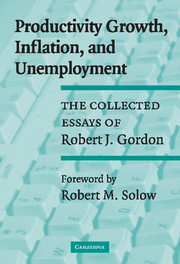Book contents
- Frontmatter
- Contents
- Foreword by Robert M. Solow
- Preface
- Introduction
- PART ONE THE HISTORY, THEORY, AND MEASUREMENT OF PRODUCTIVITY GROWTH
- Part One Introduction
- 1 Does the “New Economy” Measure Up to the Great Inventions of the Past?
- 2 Interpreting the “One Big Wave” in U.S. Long-term Productivity Growth
- 3 The Disappearance of Productivity Change
- 4 The Concept of Capital
- 5 Is There a Tradeoff between Unemployment and Productivity Growth?
- 6 Forward into the Past: Productivity Retrogression in the Electric Generating Industry
- PART TWO INTERPRETING PRODUCTIVITY FLUCTUATIONS OVER THE BUSINESS CYCLE
- PART THREE THE THEORY OF THE INFLATION-UNEMPLOYMENT TRADEOFF
- PART FOUR EMPIRICAL STUDIES OF INFLATION DYNAMICS IN THE UNITED STATES
- Subject Index
- Author Index
- References
4 - The Concept of Capital
Published online by Cambridge University Press: 10 December 2009
- Frontmatter
- Contents
- Foreword by Robert M. Solow
- Preface
- Introduction
- PART ONE THE HISTORY, THEORY, AND MEASUREMENT OF PRODUCTIVITY GROWTH
- Part One Introduction
- 1 Does the “New Economy” Measure Up to the Great Inventions of the Past?
- 2 Interpreting the “One Big Wave” in U.S. Long-term Productivity Growth
- 3 The Disappearance of Productivity Change
- 4 The Concept of Capital
- 5 Is There a Tradeoff between Unemployment and Productivity Growth?
- 6 Forward into the Past: Productivity Retrogression in the Electric Generating Industry
- PART TWO INTERPRETING PRODUCTIVITY FLUCTUATIONS OVER THE BUSINESS CYCLE
- PART THREE THE THEORY OF THE INFLATION-UNEMPLOYMENT TRADEOFF
- PART FOUR EMPIRICAL STUDIES OF INFLATION DYNAMICS IN THE UNITED STATES
- Subject Index
- Author Index
- References
Summary
Edward F. Denison was a great economist. Following on Robert Solow's (1957) demonstration that one could proxy the elasticity of output to changes in an input by that input's income share (assuming competitive factor pricing and constant returns to scale), Denison went on to invent and develop the field of growth accounting. Many of the basic innovations in this field were his, especially the treatment of labor input as human capital, the use of incomes stratified by educational attainment to obtain a measure of labor quality, and the recognition that some of these income differences reflect innate ability rather than the contribution of education.
Perhaps the most contentious issue in the field of growth accounting has been the concept of capital input, and especially the allocation of the fruits of technical advance between the contribution of capital and the residual factor that Denison variously called “advances in knowledge,” “residual productivity,” or “output per unit of input.” Thus it is fitting that Denison's last published article is devoted to an insightful and probing analysis of the concept of capital, taking as his point of departure my recent book, The Measurement of Durable Goods Prices. I am honored that my book served as a catalyst for his final thoughts on capital measurement.
POINTS OF AGREEMENT AND DISAGREEMENT
My book was the first to advocate a criterion for comparing capital goods based on their ability to produce real net revenue, defined as gross output minus variable costs spent on labor, energy, and other intermediate inputs.
- Type
- Chapter
- Information
- Productivity Growth, Inflation, and UnemploymentThe Collected Essays of Robert J. Gordon, pp. 134 - 142Publisher: Cambridge University PressPrint publication year: 2003



